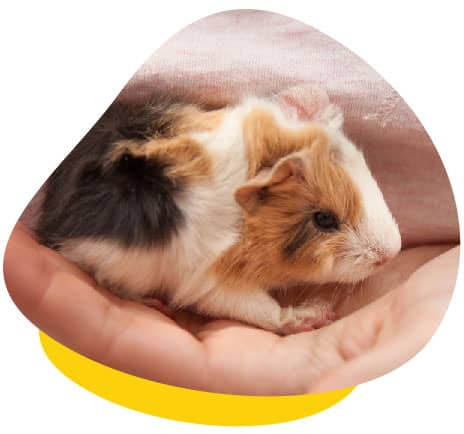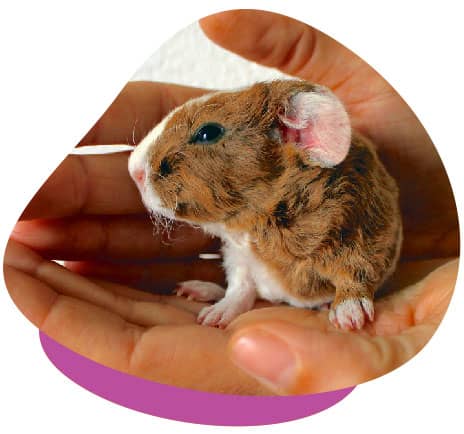To care for newborn/baby guinea pigs, provide a warm, safe environment and a balanced diet. Monitor their health and handle them gently.
Welcoming newborn or baby guinea pigs into your home is an exciting time filled with joy and responsibility. These tiny creatures require special care and attention to thrive in their new environment. By creating a warm and safe space for them, ensuring they have a proper diet, and monitoring their health regularly, you can help them grow into healthy and happy adult guinea pigs.
In this guide, we will explore the essential steps to caring for newborn/baby guinea pigs, from setting up their habitat to handling them with care. Let’s dive in and learn how to provide the best care for these adorable little pets.
Contents
Introduction To Newborn Guinea Pig Care
Discover essential tips for caring for newborn guinea pigs, ensuring warmth, proper nutrition, and a safe environment. Learn to handle them gently and provide the care they need to thrive.
First Days At Home
When bringing a newborn guinea pig home, it’s essential to provide a warm and comfortable environment. Ensure that their living space is free from drafts and loud noises. Set up a cozy, well-ventilated cage with soft bedding and a hiding spot for the little one to feel secure. Prepare a dedicated area away from other pets to minimize stress on the newborn guinea pig.
Understanding Their Needs
Understanding the needs of a newborn guinea pig is crucial for their well-being. Feeding them with appropriate food, such as timothy hay, fresh vegetables, and pellets, is vital for their growth. Regularly cleaning their cage and ensuring access to clean water is essential for maintaining their hygiene. Monitoring their health and behavior to detect any signs of illness or distress is a key part of caring for a newborn guinea pig.

Credit: www.unusualpetvets.com.au
Setting Up The Perfect Habitat
Setting up the perfect habitat is essential for the health and well-being of your newborn or baby guinea pigs. Creating a comfortable and safe environment will ensure that they thrive and remain happy. Let’s explore the key elements of setting up the ideal habitat for your adorable guinea pigs.
Choosing The Right Cage
When selecting a cage for your baby guinea pigs, opt for a spacious enclosure that provides ample room for them to move around. Ensure that the bars are spaced closely together to prevent escape and injury. A solid bottom cage is preferable to wire-bottomed cages to avoid foot injuries.
Bedding And Comfort
Select soft, absorbent bedding such as paper-based bedding or fleece liners to keep your guinea pigs cozy. Avoid cedar or pine shavings as they can be harmful to their respiratory systems. Additionally, provide cozy hideouts and tunnels to create a sense of security for your guinea pigs.
Temperature Control
Maintain a consistent temperature in the guinea pig habitat, ideally between 65-75°F (18-24°C). Use a thermometer to monitor the temperature and ensure it remains within this range. Avoid placing the cage in drafty areas or direct sunlight to prevent temperature fluctuations.
Nutrition For Newborn Guinea Pigs
When it comes to caring for newborn guinea pigs, proper nutrition is vital for their growth and development. Understanding the dietary needs of newborn guinea pigs is essential for ensuring their health and well-being. In this guide, we will explore the nutritional requirements of newborn guinea pigs, focusing on the subheading: Nutrition for Newborn Guinea Pigs.
Mother’s Milk And Alternatives
Mother’s milk is the primary source of nutrition for newborn guinea pigs. It provides essential nutrients and antibodies that are crucial for their growth and immunity. If the mother is unable to nurse the newborns, commercially available guinea pig milk replacers can be used as alternatives. These milk replacers are specially formulated to provide the necessary nutrients for young guinea pigs.
Transitioning To Solid Food
As newborn guinea pigs grow, they will gradually transition from relying solely on mother’s milk to consuming solid food. Introducing hay and pellets into their diet is essential for the weaning process. Fresh vegetables can also be introduced gradually to provide additional nutrients and moisture.
Vitamin C: A Crucial Component
Vitamin C is a crucial component of a newborn guinea pig’s diet. Guinea pigs cannot produce vitamin C on their own, so it is important to provide them with supplements or fresh sources of this essential vitamin. Including fresh vegetables and fruits high in vitamin C, such as bell peppers and oranges, is essential for meeting their dietary requirements.

Credit: www.unusualpetvets.com.au
Hydration Is Key
When it comes to caring for newborn or baby guinea pigs, hydration is key. As with any young animal, guinea pigs require plenty of water to stay healthy and happy. In this article, we’ll explore safe water sources and ways to monitor your guinea pig’s intake.
Safe Water Sources
The best source of water for your baby guinea pig is fresh, clean water from a bottle or bowl. Make sure to change the water daily and keep the bottle or bowl clean to prevent the growth of harmful bacteria. Avoid giving your guinea pig tap water, as it may contain harmful chemicals or minerals that can be harmful to their health. Instead, opt for filtered or bottled water.
Monitoring Intake
It’s important to monitor your guinea pig’s water intake to ensure they are getting enough hydration. A good rule of thumb is to offer your guinea pig water at least twice a day, and to check their water bottle or bowl regularly to make sure they are drinking. You can also monitor your guinea pig’s hydration levels by gently pinching the skin on the back of their neck. If the skin springs back quickly, your guinea pig is well-hydrated. If the skin takes longer to spring back, your guinea pig may be dehydrated and require more water.
Overall, keeping your baby guinea pig hydrated is essential to their health and well-being. By providing fresh, clean water and monitoring their intake, you can ensure that your guinea pig stays happy and healthy.
Health Checks And Grooming
When it comes to caring for your newborn/baby guinea pigs, ensuring their health and grooming needs are met is crucial. Regular health checks and proper grooming practices play a vital role in keeping your guinea pigs happy and healthy.
Routine Health Monitoring
Regular health checks are essential to identify any potential issues early on. Keep an eye on weight, appetite, and activity levels.
Grooming Basics
Grooming your guinea pigs helps maintain their skin and coat health. Brushing and nail trimming are important grooming tasks.
Socialization And Handling
Ensuring proper socialization and gentle handling is crucial for the well-being of newborn/baby guinea pigs.
The Importance Of Early Socialization
Early socialization helps baby guinea pigs grow up to be friendly and comfortable with human interaction.
Handling: Dos And Don’ts
- Do: Hold them gently and support their body.
- Do: Speak softly to them to build trust.
- Don’t: Squeeze or hold them too tightly.
- Don’t: Startle them with sudden movements.
Common Health Issues
Proper care for newborn/baby guinea pigs is crucial to prevent common health issues. Regular health checks and a balanced diet are essential for their well-being and growth. Providing a clean and safe environment will ensure they thrive and stay healthy.
Common Health Issues: Caring for Newborn/Baby Guinea PigsRecognizing Symptoms: It is essential to recognize the symptoms of common health issues in newborn/baby guinea pigs to ensure their well-being. Some of the common symptoms are:1. Diarrhea 2. Sneezing and coughing 3. Runny nose and eyes 4. Loss of appetite 5. Lethargy 6. Bald patches and itchy skinWhen to Visit the Vet: If you notice any of the above symptoms in your newborn/baby guinea pig, it is crucial to visit the vet immediately. Delaying medical attention can lead to severe health issues and even death. Always look for signs of discomfort or illness in your guinea pig, as they cannot communicate their pain or discomfort like humans.Prevention is Key: Prevention is the key to keeping your newborn/baby guinea pig healthy. Ensure their living area is clean, dry, and free from dust. Keep their bedding clean and change it regularly. Provide them with fresh water and a well-balanced diet to avoid malnutrition. Additionally, ensure they have ample space to move around and play to prevent boredom and stress.In conclusion, recognizing the symptoms of common health issues, knowing when to visit the vet, and taking preventive measures can help ensure the well-being of your newborn/baby guinea pig. Remember, your furry friend relies on you for their health and happiness, so take care of them like you would a member of your family.Bonding With Your Newborn Guinea Pig
Bonding with your newborn guinea pig is crucial for their growth and development. Spend time holding and interacting with your baby guinea pig to help them feel safe and loved. Providing a warm and comfortable living space, fresh food and water, and regular vet check-ups are important in caring for your baby guinea pig.
Congratulations on your new furry addition! Guinea pigs are social animals and thrive on interaction with their owners. It is essential to start bonding with your newborn guinea pig from the beginning to establish a trusting relationship. Here are some tips on how to bond with your newborn guinea pig:Creating A Trusting Relationship
To create a trusting relationship with your newborn guinea pig, it is essential to handle them gently and frequently. Start by offering your guinea pig a treat, such as a small piece of carrot or lettuce, and let them come to you. Gradually increase the amount of time you spend holding and petting your guinea pig. Speak softly and avoid sudden movements to help them feel safe and secure.Interactive Activities
Interactive activities are a great way to bond with your newborn guinea pig. Playtime is a perfect opportunity to interact and socialize with your furry friend. Provide toys and tunnels for your guinea pig to explore and play with. You can also try training your guinea pig to do simple tricks, such as running through a tunnel or jumping over a small hurdle. Remember, guinea pigs are social animals, so it’s essential to spend time with them every day.Bonding with your newborn guinea pig is crucial for establishing a trusting relationship. Handling them gently and frequently, offering treats, and providing interactive activities are great ways to bond with your furry friend. Remember, guinea pigs are social animals, and they need daily interaction and attention to thrive. With a little patience and love, you’ll have a strong bond with your guinea pig in no time!
Credit: supremepetfoods.com
Frequently Asked Questions
How Often Should I Feed My Newborn Guinea Pig?
Newborn guinea pigs should be fed small amounts of fresh hay, pellets, and vegetables multiple times a day. Aim to provide food every 2-3 hours to ensure they get enough nutrition for growth and development. It’s important to monitor their weight gain and consult a veterinarian for specific feeding guidelines.
How Do I Keep My Baby Guinea Pig Warm?
To keep your baby guinea pig warm, provide a draft-free environment with a temperature between 68-75°F (20-24°C). Use a heating pad or a heat lamp set to a low temperature to create a warm spot in their enclosure. Ensure they have enough bedding to snuggle into and avoid sudden temperature changes.
How Can I Tell If My Newborn Guinea Pig Is Healthy?
A healthy newborn guinea pig will have a rounded belly, clear eyes, and a shiny coat. They should be active and responsive, with no signs of lethargy or difficulty breathing. Regularly check their weight and monitor for any signs of illness, such as diarrhea or lack of appetite.
Consult a veterinarian if you have concerns about their health.
Can I Handle My Baby Guinea Pig?
Yes, you can handle your baby guinea pig, but be gentle and cautious. Support their body with both hands, ensuring they feel secure and comfortable. Avoid excessive handling in the first few days to allow them to adjust to their new environment.
Gradually increase handling time to socialize and bond with your guinea pig.
Conclusion
To sum up, caring for newborn or baby guinea pigs requires utmost attention and dedication. Providing a warm and safe environment, along with a balanced diet and regular health check-ups, is crucial for their well-being. Additionally, social interaction and gentle handling play a significant role in building trust and ensuring their happiness.
By following these guidelines, you can create a nurturing environment that allows your guinea pigs to thrive and flourish. Remember, their happiness is a reflection of your love and care.

